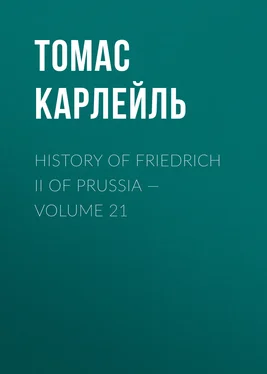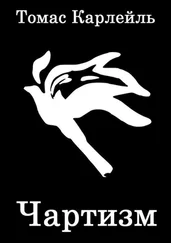Томас Карлейль - History of Friedrich II of Prussia — Volume 21
Здесь есть возможность читать онлайн «Томас Карлейль - History of Friedrich II of Prussia — Volume 21» — ознакомительный отрывок электронной книги совершенно бесплатно, а после прочтения отрывка купить полную версию. В некоторых случаях можно слушать аудио, скачать через торрент в формате fb2 и присутствует краткое содержание. Жанр: foreign_prose, История, literature_19, foreign_edu, foreign_antique, на английском языке. Описание произведения, (предисловие) а так же отзывы посетителей доступны на портале библиотеки ЛибКат.
- Название:History of Friedrich II of Prussia — Volume 21
- Автор:
- Жанр:
- Год:неизвестен
- ISBN:нет данных
- Рейтинг книги:3 / 5. Голосов: 1
-
Избранное:Добавить в избранное
- Отзывы:
-
Ваша оценка:
- 60
- 1
- 2
- 3
- 4
- 5
History of Friedrich II of Prussia — Volume 21: краткое содержание, описание и аннотация
Предлагаем к чтению аннотацию, описание, краткое содержание или предисловие (зависит от того, что написал сам автор книги «History of Friedrich II of Prussia — Volume 21»). Если вы не нашли необходимую информацию о книге — напишите в комментариях, мы постараемся отыскать её.
History of Friedrich II of Prussia — Volume 21 — читать онлайн ознакомительный отрывок
Ниже представлен текст книги, разбитый по страницам. Система сохранения места последней прочитанной страницы, позволяет с удобством читать онлайн бесплатно книгу «History of Friedrich II of Prussia — Volume 21», без необходимости каждый раз заново искать на чём Вы остановились. Поставьте закладку, и сможете в любой момент перейти на страницу, на которой закончили чтение.
Интервал:
Закладка:
KING OF POLAND DIES; AND THERE ENSUE HUGE ANARCHIES IN THAT COUNTRY
The poor old King of Poland—whom we saw, on that fall of the curtain at Pirna seven years ago, rush off for Warsaw with his Bruhl, with expressive speed and expressive silence, and who has been waiting there ever since, sublimely confident that his powerful terrestrial friends, Austria, Russia, France, not to speak of Heaven's justice at all, would exact due penalty, of signal and tremendous nature, on the Prussian Aggressor—has again been disappointed. The poor old Gentleman got no compensation for his manifold losses and woes at Pirna or elsewhere; not the least mention of such a thing, on the final winding-up of that War of Seven Years, in which his share had been so tragical; no alleviation was provided for him in this world. His sorrows in Poland have been manifold; nothing but anarchies, confusions and contradictions had been his Royal portion there: in about Forty different Diets he had tried to get some business done,—no use asking what; for the Diets, one and all, exploded in NIE POZWALAM; and could do no business, good, bad or indifferent, for him or anybody. An unwise, most idle Country; following as chief employment perpetual discrepancy with its idle unwise King and self; Russia the virtual head of it this long while, so far as it has any head.
FEBRUARY-AUGUST, 1763, just while the Treaty of Hubertsburg was blessing everybody with the return of Peace, and for long months after Peace had returned to everybody, Polish Majesty was in sore trouble. Trouble in regard to Courland, to his poor Son Karl, who fancied himself elected, under favor and permission of the late Czarina our gracious Protectress and Ally, to the difficult post of Duke in Courland; and had proceeded, three or four years ago, to take possession,—but was now interrupted by Russian encroachments and violences. Not at all well disposed to him, these new Peters, new Catharines. They have recalled their Bieren from Siberia; declare that old Bieren is again Duke, or at least that young Bieren is, and not Saxon Karl at all; and have proceeded, Czarina Catharine has, to install him forcibly with Russian soldiers. Karl declares, "You shall kill ME before you or he get into this Palace of Mietau!"—and by Domestics merely, and armed private Gentlemen, he does maintain himself in said Palatial Mansion; valiantly indignant, for about six months; the Russian Battalions girdling him on all sides, minatory more and more, but loath to begin actual bloodshed. [Rulhiere, ii. (livre v.) 81 et antea; Hermann, v. 348 et seq.] A transaction very famed in those parts, and still giving loud voice in the Polish Books, which indeed get ever noisier from this point onward, till they end in inarticulate shrieks, as we shall too well hear.
Empress Catharine, after the lapse of six months, sends an Ambassador to Warsaw (Kayserling by name), who declares, in tone altogether imperative, that Czarish Majesty feels herself weary of such contumacy, weary generally of Polish Majesty's and Polish Republic's multifarious contumacies; and, in fine, cruelest of all, that she has troops on the frontier; that Courland is not the only place where she has troops. What a stab to the poor old man! "Contumacies?" Has not he been Russia's patient stepping-stone, all along; his anarchic Poland and he accordant in that, if in nothing else? "Let us to Saxony," decides he passionately, "and leave all this." In Saxony his poor old Queen is dead long since; much is dead: Saxony and Life generally, what a Golgotha! He immediately sends word to Karl, "Give up Courland; I am going home!"—and did hastily make his packages, and bid adieu to Warsaw, and, in a few weeks after to this anarchic world altogether. Died at Dresden, 5th October, 1763.
Polish Majesty had been elected 5th October, 1733; died, you observe, 5th October, 1763;—was King of Poland ("King," save the mark!) for 30 years to a day. Was elected—do readers still remember how? Leaves a ruined Saxony lying round him; a ruined life mutely asking him, "Couldst thou have done no better, then?" Wretched Bruhl followed him in four or five weeks. Nay, in about two months, his Son and Successor, "Friedrich Christian" (with whom we dined at Moritzburg), had followed him; [Prince died 17th December (Bruhl, 18th November), 1763.] leaving a small Boy, age 13, as new Kurfurst, "Friedrich August" the name of him, with guardians to manage the Minority; especially with his Mother as chief guardian,—of whom, for two reasons, we are now to say something. Reason FIRST is, That she is really a rather brilliant, distinguished creature, distinguished more especially in Friedrich's world; whose LETTERS to her are numerous, and, in their kind, among the notablest he wrote;—of which we would gladly give some specimen, better or worse; and reason SECOND, That in so doing, we may contrive to look, for a moment or two, into the preliminary Polish Anarchies at first-hand; and, transiently and far off, see something of them as if with our own eyes.
Marie-Antoine, or Marie-Antoinette, Electress of Saxony, is still a bright Lady, and among the busiest living; now in her 40th year: "born 17th July, 1724; second child of Kaiser Karl VII.;"—a living memento to us of those old times of trouble. Papa, when she came to him, was in his 27th year; this was his second daughter; three years afterwards he had a son (born 1727; died 1777), who made the "Peace of Fussen," to Friedrich's disgust, in 1745, if readers recollect;—and who, dying childless, will give rise to another War (the "Potato War" so called), for Friedrich's behoof and ours. This little creature would be in her teens during that fatal Kaisership (1742-1745, her age then 18-21),—during those triumphs, flights and furnished-lodging intricacies. Her Mamma, whom we have seen, a little fat bullet given to devotion, was four years younger than Papa. Mamma died "11th December, 1756," Germany all blazing out in War again; she had been a Widow eleven years.
Marie-Antoine was wedded to Friedrich Christian, Saxon Kurprinz, "20th June, 1747;" her age 23, his 25:—Chronology itself is something, if one will attend to it, in the absence of all else! The young pair were Cousins, their Mothers being Sisters; Polish Majesty one's Uncle, age now 51,—who was very fond of us, poor indolent soul, and glad of our company on an afternoon, "being always in his dressing-gown by 2 o'clock." Concerning which the tongue of Court scandal was not entirely idle,—Hanbury chronicling, as we once noticed. All which I believe to be mere lying wind. The young Princess was beautiful; extremely clever, graceful and lively, we can still see for ourselves: no wonder poor Polish Majesty, always in his dressing-gown by 2, was charmed to have her company,—the rather as I hope she permitted him a little smoking withal.
Her husband was crook-backed; and, except those slight, always perfectly polite little passages, in Schmettau's Siege (1759), in the Hubertsburg Treaty affair, in the dinner at Moritzburg, I never heard much history of him. He became Elector 5th October, 1763; but enjoyed the dignity little more than two months. Our Princess had borne him seven children,—three boys, four girls,—the eldest about 13, a Boy, who succeeded; the youngest a girl, hardly 3. The Boy is he who sent Gellert the caparisoned Horse, and had estafettes on the road while Gellert lay dying. This Boy lived to be 77, and saw strange things in the world; had seen Napoleon and the French Revolution; was the first "King of Saxony" so called; saw Jena, retreat of Moscow; saw the "Battle of the Nations" (Leipzig, 15th-18th October, 1813), and his great Napoleon terminate in bankruptcy. He left no Son. A Brother, age 72, succeeded him as King for a few years; whom again a Brother would have succeeded, had not he (this third Brother, age now 66) renounced, in favor of HIS Son, the present King of Saxony. Enough, enough!—
Читать дальшеИнтервал:
Закладка:
Похожие книги на «History of Friedrich II of Prussia — Volume 21»
Представляем Вашему вниманию похожие книги на «History of Friedrich II of Prussia — Volume 21» списком для выбора. Мы отобрали схожую по названию и смыслу литературу в надежде предоставить читателям больше вариантов отыскать новые, интересные, ещё непрочитанные произведения.
Обсуждение, отзывы о книге «History of Friedrich II of Prussia — Volume 21» и просто собственные мнения читателей. Оставьте ваши комментарии, напишите, что Вы думаете о произведении, его смысле или главных героях. Укажите что конкретно понравилось, а что нет, и почему Вы так считаете.









